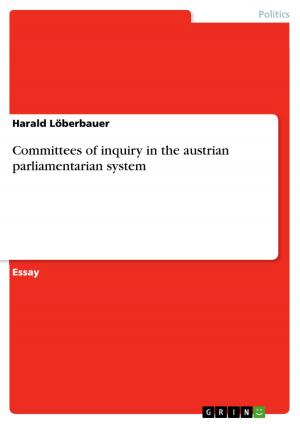| Author: | Thomas Kramer | ISBN: | 9783638111621 |
| Publisher: | GRIN Publishing | Publication: | February 6, 2002 |
| Imprint: | GRIN Publishing | Language: | English |
| Author: | Thomas Kramer |
| ISBN: | 9783638111621 |
| Publisher: | GRIN Publishing |
| Publication: | February 6, 2002 |
| Imprint: | GRIN Publishing |
| Language: | English |
Seminar paper from the year 2000 in the subject Computer Science - Commercial Information Technology, grade: 2,0 (B), UNITEC New Zealand (Information Systems), 3 entries in the bibliography, language: English, abstract: The PRS (Performance Right Industry) is a non-profit organization in the United Kingdom that collects the royalties for the holder of the copyrights of music songs when they are performed at a concert or played at the radio. With the guardianship of the musical performance rights from over 750,000 copyright holders and a £155 million collected from 26,000 UK members each year the PRS has a complex role. It is controlled by the General Council, which is responsible for the administration and formulation of the policy. The management team consists of a CEO and his team of executive directors who are responsible for the day-to-day running of the business. For the complex administration processes several distinct applications are running on multiple mainframe computers. The PROMS (Performance Rights On-Line Membership System) project was conceived in 1987 with its aim to get rid of the mainframe computers and replace them through several mini computers. The data and mainframe applications should be combined into one coherent database to reduce the redundant sets of identical information stored on different computer systems. The new system should allow 300 people to use the computers concurrently. Therefore a special OLTP application was needed to provide adequate response times for all users. Concerning this application, which required a high performance hard- and software environment, there was a heavy debate in the industry about the feasibility to use such a demanding software on minicomputers. For this reason the project required a careful design and planning. (The Performing Rights Society - Case Facts, no year)
Seminar paper from the year 2000 in the subject Computer Science - Commercial Information Technology, grade: 2,0 (B), UNITEC New Zealand (Information Systems), 3 entries in the bibliography, language: English, abstract: The PRS (Performance Right Industry) is a non-profit organization in the United Kingdom that collects the royalties for the holder of the copyrights of music songs when they are performed at a concert or played at the radio. With the guardianship of the musical performance rights from over 750,000 copyright holders and a £155 million collected from 26,000 UK members each year the PRS has a complex role. It is controlled by the General Council, which is responsible for the administration and formulation of the policy. The management team consists of a CEO and his team of executive directors who are responsible for the day-to-day running of the business. For the complex administration processes several distinct applications are running on multiple mainframe computers. The PROMS (Performance Rights On-Line Membership System) project was conceived in 1987 with its aim to get rid of the mainframe computers and replace them through several mini computers. The data and mainframe applications should be combined into one coherent database to reduce the redundant sets of identical information stored on different computer systems. The new system should allow 300 people to use the computers concurrently. Therefore a special OLTP application was needed to provide adequate response times for all users. Concerning this application, which required a high performance hard- and software environment, there was a heavy debate in the industry about the feasibility to use such a demanding software on minicomputers. For this reason the project required a careful design and planning. (The Performing Rights Society - Case Facts, no year)















